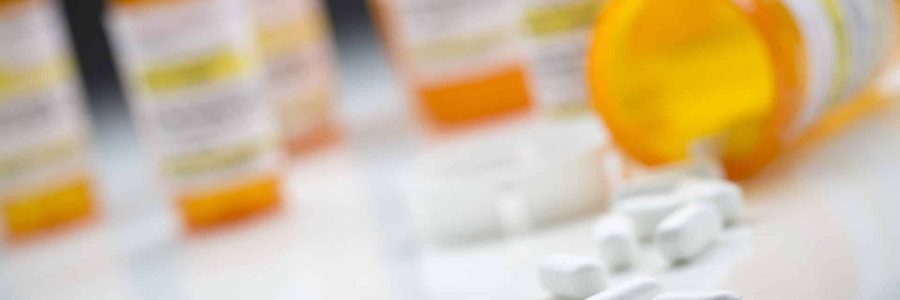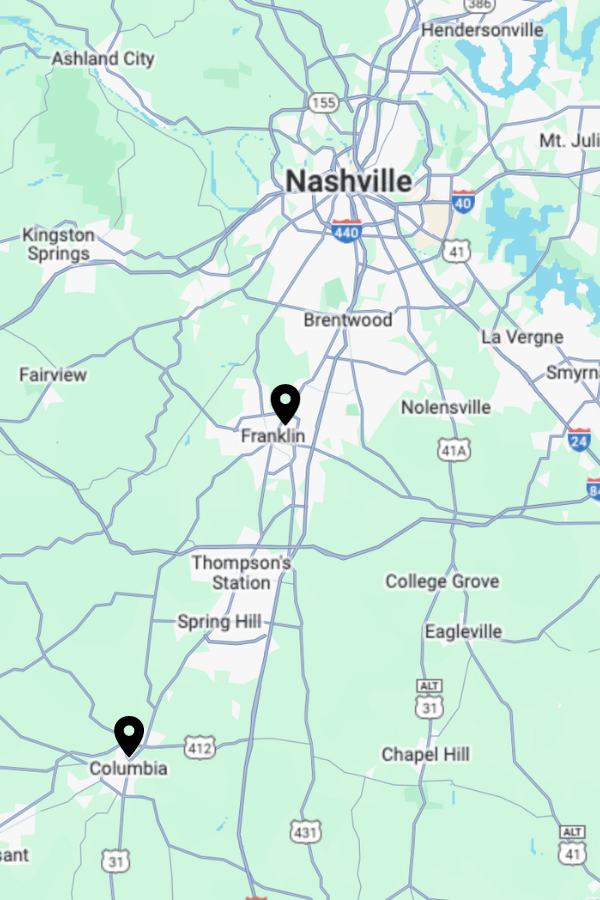
Prescription Drugs, What Are They?
Prescription drugs, also known as prescription medications or prescription drugs, are pharmaceuticals prescribed by healthcare professionals to treat specific medical conditions. Unlike over-the-counter medications, prescription drugs require a written or electronic order from a licensed healthcare provider such as a doctor, nurse practitioner, or physician assistant.
These medications include a wide range of substances, including painkillers (opioids), sedatives, stimulants, antidepressants, and antipsychotics, among others. The most addictive prescription drugs can be highly beneficial when used as directed under medical supervision, but they also carry high risks of medication misuse, prescription drug dependency, and addiction if not taken responsibly.
About Our Prescription Drug Rehab Programs
Our prescription drug addiction treatment programs at Apex Recovery Tennessee emphasize recovery by addressing psychological, behavioral, and pharmacological factors. Counseling therapy and complementary approaches and programs aim to help clients develop skills to cope with cravings and stress factors that prompted them into addiction initially. They also learn how to avoid tempting situations, live a balanced life, maintain their motivation, and manage relapse if it comes to that.
We provide treatment for, but are not limited to, the following medications and pills:
- Benzodiazepines – Xanax, Valium, Klonopin, and Ativan
- Stimulants – Adderall, Amphetamine Salts, Ecstasy, and MDMA
- Opiates – Hydrocodone, Vicodin, OxyContin, Codeine, Fentanyl, Dilaudid, Lortab, and Morphine
- Other prescription medications – Tramadol, Suboxone, Ambien, Methadone, and Percocet
Our clinical staff provides many available therapeutic methods, such as individual and group counseling, counseling for families, cognitive-behavioral therapy (CBT), and dialectical behavior therapy (DBT). We are proud that we have the means to design a fully customized recovery plan for every one of our clients.
These theoretical approaches are backed by auxiliary programs focusing on well-being, holistic healing, and self-expression. This includes massages, recreation, yoga, meditation, nutritional counseling, and artistic therapies.
Free Addiction Assessment
Schedule a free, confidential assessment with a licensed clinician. Apex Recovery can check your insurance coverage levels for drug and alcohol addiction, and mental health treatment.
What is a Drug Addiction Rehab Treatment Program?
A prescription opioid addiction rehab treatment program is a comprehensive program to help people overcome addiction to prescription medications. These programs offer a combination of medical, psychological, and behavioral therapies. Treatment may include detoxification to safely manage prescription drug withdrawal symptoms, individual and group therapy sessions, education on addiction and prescription drug misuse prevention strategies, and support services for long-term recovery.
Additionally, holistic approaches such as mindfulness practices, nutritional counseling, and fitness programs may be integrated to support overall well-being during the recovery process. The goal is to empower patients to achieve and maintain sobriety while improving their overall quality of life.

- Please complete and send the form below.
- One of our staff members will contact your insurer to check your coverage.
- We will contact you promptly with the results and to discuss the next steps.
Insurance Verification
"*" indicates required fields
How to Find Prescription Drug Rehab in Middle Tennessee
At Apex Addiction Recovery Center in Tennessee, we provide comprehensive substance abuse treatment programs fit to meet the distinct needs of each patient. Our programs include Partial Hospitalization Program (PHP), Intensive Outpatient Program (IOP), Medication-Assisted Treatment (MAT), and general outpatient services. We are dedicated to helping people overcome prescription drug addiction and reclaim their lives.

Apex Recovery Franklin
4601 Carothers Pkwy STE 250A
Franklin, TN 37067
Apex Recovery Columbia
2710 Trotwood Ave STE A & B
Columbia, TN 38401
Prescription Drug Rehab Program in Tennessee (TN)
We are currently accepting new patients and offer housing options to support the recovery journey. If you or someone you know is struggling with prescription drug addiction in the Volunteer State, we encourage you to reach out to us today. You can visit our locations at Apex Recovery Franklin or Apex Recovery Columbia. For more information or to get started on your path to recovery, please call (877) 881-2689 or fill out the form on our website: contact us here.
How To Find a Prescription Drug Rehab Facility Near Me
To discover alternative prescription drug rehab in Tennessee, follow these steps:
- Use Online Search: Employ search engines to locate prescription drug rehab facilities in Tennessee. Include specific terms like “prescription drug rehab,” “prescription drug addiction treatment centers,” or “prescription drug rehab near me” for focused results.
- Explore Treatment Directories: Investigate online directories or databases that list addiction treatment centers and rehab facilities in Tennessee. These resources often permit filtering by location, treatment methods, and substances of misuse.
- Reach Out to Local Health Services: Contact local health departments, community health clinics, or mental health agencies in Tennessee for guidance and referrals to prescription drug rehab facilities nearby.
- Seek Advice from Healthcare Providers: Discuss your needs with your primary care physician, psychiatrist, or addiction specialist. They can offer tailored suggestions for reputable prescription drug rehab facilities based on your circumstances.
- Verify Insurance Coverage: Connect with your health insurance provider to check coverage for prescription drug rehab services in Tennessee. They can furnish details on facilities in their network and coverage particulars.
- Investigate Reviews: Research the reputation of potential prescription drug rehab facilities in Tennessee by perusing reviews or testimonials from previous clients. This can provide insights into the quality of care and client experiences.
- Review Facility Websites: Visit the websites of prescription drug rehab facilities you’re considering to explore their treatment offerings, therapeutic approaches, staff credentials, amenities, and admission procedures.

What Are Different Types of Addictive Prescription Drugs?
Various prescription drugs can be addictive, including opioids like Oxycodone (OxyContin) and Hydrocodone (Vicodin), benzodiazepines such as Lorazepam (Ativan), Alprazolam (Xanax), and Diazepam (Valium), stimulants like Ritalin and Adderall, sleep medications such as Zaleplon (Sonata), Zolpidem (Ambien), and Eszopiclone (Lunesta), and muscle relaxants like Cyclobenzaprine (Flexeril) and Carisoprodol (Soma).Opioids – Oxycodone (OxyContin) and Hydrocodone (Vicodin)
Opioids, including Oxycodone (OxyContin) and Hydrocodone (Vicodin), are potent pain relievers commonly prescribed for moderate to severe pain. However, they carry a high risk of addiction due to their euphoric effects. Prolonged use or misuse can lead to physical dependence and addiction, often requiring professional treatment to overcome.Benzodiazepines – Lorazepam (Ativan), Alprazolam (Xanax), and Diazepam (Valium)
Benzodiazepines, such as Lorazepam (Ativan), Alprazolam (Xanax), and Diazepam (Valium), are central nervous system depressants commonly prescribed for anxiety, insomnia, and other conditions. While effective for short-term use, they carry a risk of dependency and addiction, especially with long-term or misuse. Withdrawal from benzodiazepines can be severe, requiring medical supervision during detoxification and rehabilitation.Stimulants – Ritalin and Adderall
Stimulants like Ritalin and Adderall are commonly prescribed for attention deficit hyperactivity disorder (ADHD) and narcolepsy. They work by increasing dopamine and norepinephrine levels in the brain, improving focus, attention, and alertness. However, they also carry a potential for misuse and addiction, especially when taken in higher doses or by people without a prescription.Sleep Medications – Zaleplon (Sonata), Zolpidem (Ambien), and Eszopiclone (Lunesta)
Sleep medications such as Zaleplon (Sonata), Zolpidem (Ambien), and Eszopiclone (Lunesta) are prescribed to treat insomnia by promoting sleep onset or maintenance. While effective for short-term use, they can be habit-forming if taken for extended periods. Misuse or dependence on these medications can lead to withdrawal symptoms and rebound insomnia, requiring careful monitoring and management during prescription drug misuse treatment.Muscle Relaxants – Cyclobenzaprine (Flexeril) and Carisoprodol (Soma)
Muscle relaxants like Cyclobenzaprine (Flexeril) and Carisoprodol (Soma) are prescribed to alleviate muscle spasms and pain associated with musculoskeletal conditions. However, they have the possibility for prescription medication abuse and dependence due to their sedative effects. Prolonged use or misuse can lead to tolerance, withdrawal symptoms, and addiction, highlighting the importance of cautious prescribing and monitoring by healthcare providers.
How Does Someone Become Addicted to Prescription Drugs?
Prescription drug addiction typically begins with legitimate medical use. Over time, people may develop tolerance, requiring higher doses for the same effect. Some may misuse medications for recreational purposes or to cope with stress. Factors like genetic predisposition, mental health disorders, and environmental influences can contribute. Continued use can lead to physical dependence and addiction. The brain adapts to the drug’s presence, altering neurotransmitter levels and functioning. Withdrawal symptoms upon cessation often reinforce continued use. Seeking professional help is crucial to address addiction and facilitate recovery through various treatment approaches.What Are Some Signs and Symptoms of Prescription Drug Addiction?
Signs of prescription drug addiction include changes in behavior, social isolation, and using drugs for non-medical purposes. Additionally, symptoms may include withdrawal discomfort, increased tolerance, and continued use despite harm. Neglecting responsibilities, engaging in deceptive practices, and financial problems are also common. Recognizing these signs is vital for early prescription drug misuse intervention and seeking appropriate treatment.Withdrawal Symptoms and Increased Tolerance to Prescription
Signs of prescription drug addiction often include experiencing withdrawal symptoms upon cessation and developing an increased tolerance, requiring higher doses for the same effect. These indicators reflect the body’s adaptation to the drug’s presence, leading to physical dependence and reinforcing continued use. Recognizing these signs is crucial for early intervention and seeking appropriate treatment.Loss of Control and Preoccupation
Loss of control and preoccupation with obtaining and using prescription drugs are common signs of addiction. People may find it difficult to control their drug use even though there are negative consequences, and their thoughts may be consumed by obtaining and using the substance. These behaviors can significantly impair daily functioning and indicate the need for professional intervention and treatment.
Continued and Extended Use Despite Harm
Continuing and prolonging the use of prescription drugs despite experiencing negative effects or harm is a hallmark sign of addiction. Despite adverse effects on physical health, relationships, or work performance, people may persist in using the substance. This behavior reflects the compulsive nature of addiction and underscores the need for intervention and comprehensive treatment to address underlying issues.Changes in Behavior and Social Isolation
Changes in behavior, such as mood swings, irritability, or secretive actions, along with social isolation, are indicative of prescription drug addiction. People may withdraw from social activities or relationships, prioritizing drug use over interpersonal connections. These changes can disrupt personal and professional life, underlining the need for intervention and support to address addiction and restore healthy relationships.Using for Non-Medical Purposes and Doctor Swapping
Using prescription drugs for non-medical purposes, such as to experience euphoria or alleviate emotional distress, is a concerning sign of addiction. Some individuals may engage in doctor shopping (or swapping) or obtaining prescriptions from multiple healthcare providers to fuel their habit. These behaviors indicate a loss of control and need comprehensive treatment to address the addiction effectively.Neglecting Responsibilities and Physical Symptoms
Neglecting responsibilities, such as work, school, or family obligations, is common among those struggling with prescription drug addiction. Additionally, physical symptoms may manifest, including changes in appetite, sleep disturbances, or unexplained weight loss or gain. These signs indicate the profound impact of addiction on a person’s life and show the importance of seeking professional help.Engaging in Deceptive Practices and Financial Problems
Engaging in deceptive practices, such as lying or stealing to obtain prescription drugs, is characteristic of addiction. Additionally, people may experience financial problems due to spending a significant amount of money on obtaining drugs or healthcare expenses related to addiction treatment.
Detoxing from Prescription Drugs
The first step in substance use rehabilitation is detoxification, often known as detox. Detoxing from prescription drugs is only the beginning of a more demanding challenge. Detoxification only clears away the physical side of addiction, whereas the associated mental health and social issues remain to be addressed through an addiction treatment program.
What to Expect in Our Prescription Drug Addiction Treatment in Tennessee
Treatment can be done with the client either staying onsite in residential rehabilitation or with the client coming in for therapy and programs in outpatient treatment. The choice between these two types rests on clients’ needs and goals. Once clients have successfully detoxed from prescription drugs, our addiction treatment programs teach clients to learn coping strategies they can use to help maintain a drug-free lifestyle.
The counseling component of the treatment works very well when coupled with maintenance drugs for clients recovering from opioid addiction. A qualified healthcare professional must administer these prescribed medications at Apex Recovery Tennessee. Maintenance drugs can offer support to the recovering client by combating cravings. Pharmacological treatment alone is hardly ever sufficient, but it is highly effective as an addition to counseling and other therapies.
Helping Someone With a Prescription Drug Addiction
Supporting someone with a prescription drug addiction begins with educating yourself about addiction and expressing concern for their well-being. Offer practical support and encourage seeking treatment. Provide emotional support by actively listening to their experiences. Avoid enabling behaviors and establish boundaries. Promote healthy coping strategies and seek additional support for yourself. For professional help, contact Apex Recovery in Nashville – aka Music City.Education and Expression of Concern
Educating yourself about prescription drug addiction and expressing genuine concern for your loved one’s well-being are crucial first steps. Learn about the signs, symptoms, and effects of addiction to better understand their struggle. Expressing your concerns in a non-judgmental and supportive manner can encourage them to seek help and begin their journey to recovery.Provide Practical Support and Encourage Treatment
Offering practical support, such as helping with daily tasks or transportation to treatment appointments, can alleviate some of the burdens associated with addiction. Encourage your loved one to seek professional treatment for their prescription drug addiction. Assure them that they are not alone in their journey and that seeking help is a courageous step towards healing and recovery.Provide Emotional Support and Listen Actively
Providing emotional support involves being present for your loved one, offering a listening ear, and validating their feelings without judgment. Actively listen to their experiences, concerns, and struggles with empathy and understanding. Expressing compassion and support can help them feel heard and validated, inspiring a sense of trust and connection that is essential for their recovery journey.Avoid Enabling Behaviors and Set Boundaries
Avoid enabling behaviors that inadvertently support your loved one’s addiction, such as providing money or making excuses for their actions. Instead, set clear and healthy boundaries to protect yourself and encourage accountability. Communicate these boundaries firmly but compassionately, emphasizing your commitment to their well-being while also prioritizing your own. This can help create a supportive environment conducive to recovery.Promote Healthy Coping Strategies
Encourage your loved one to develop and practice healthy coping strategies to manage stress, cravings, and emotional challenges without resorting to prescription drugs. This may include engaging in hobbies, exercise, mindfulness practices, or seeking professional counseling. By promoting these positive coping mechanisms, you can empower them to navigate difficult situations and build resilience on their journey to recovery.Seek Additional Support for Yourself
Remember to prioritize your own well-being by seeking additional support for yourself. Addiction can be emotionally taxing for family and friends, so consider joining a support group, seeking counseling, or talking to a trusted friend or family member. Taking care of yourself allows you to better support your loved one and maintain your own mental and emotional health throughout their recovery journey.Contact Apex Recovery in Nashville for Help
If you or someone you know is struggling with prescription drug addiction, don’t hesitate to reach out for help. Contact Apex Substance Addiction Recovery Center in Nashville, the country music capital, for comprehensive addiction treatment programs. Our experienced team can support you on your journey to recovery. Call us today at (877) 881-2689 or contact us online to take the first step towards a healthier, drug-free life
Prescription Drug Addiction Stats and Information in Tennessee
- There were 4,257,025 opioid painkiller prescriptions in TN in 2023
- In 2019, there were 5,450,051 opioid painkiller prescriptions in TN
- In 2023, Shelby County had the most painkiller prescriptions in TN: 358,458
- 3.4% of people aged 12 or older in Tennessee misused prescription pain relievers
- The national average for misuse of prescription pain relievers was 3.7%
- Opioid use disorder is defined as heroin use disorder or prescription pain reliever use disorder
- Prescription pain reliever misuse is defined as non-medical use of prescription drugs in any way not directed by a doctor
- 7.07% of TN residents used illicit drugs (including misuse of prescription drugs)
- Drug treatment admissions in Tennessee for other opiates (including prescription drugs) have been increasing
- Other opiates (including prescription drugs) are the most common drug treatment admission in the state
Sources:
